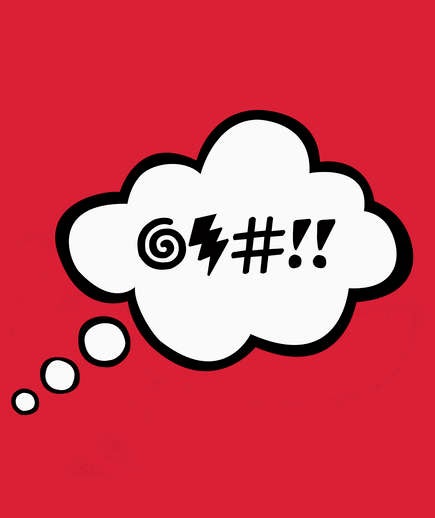
This article originally appeared on realsimple.com.
The next time you could use a little burst of power—whether you’re biking up a steep hill or simply trying to open a jar of pickles—it might help to utter a few not-safe-for-work words while giving it your all. According to a new study, swearing seems to increase strength for short periods of time.
Previous research has shown that using profanity can increase pain tolerance. Scientists think this might be because it stimulates the body’s sympathetic nervous system—the system that revs the heart rate and activates the body’s “fight or flight” response when it senses some kind of threat.
Researchers from Keele University and Long Island University Brooklyn hypothesized that this might also give people a quick strength boost, as well. To test their theory, they asked a total of 81 participants to complete short tests of anaerobic and isometric power. Some rode an exercise bike at maximum intensity for 30 seconds; others squeezed a hand-grip device as hard as they could.
They measured participants’ performance on these tests under two circumstances: once while repeating a curse word of their choosing every three seconds, and once while repeating a neutral word—something to describe a table in the room, like “flat” or “round.”
As predicted, the volunteers produced more pedaling power and had stronger hand grips while they were cursing. Surprisingly, though, the researchers found no significant differences in heart rate, blood pressure, and skin conductance (a measure that increases physiological arousal) between the swearing and non-swearing scenarios.
This suggests that the sympathetic nervous system may not be the driving factor after all, says co-author David Spierer, former associate professor of athletic training, health, and exercise science at Long Island University Brooklyn. Instead, the researchers think cursing may allow people to “shut down their inhibitions,” says Spierer, “and somewhat veil the effort and the pain of this really difficult task.”
In this way, Spierer says, using swear words might be helpful in any circumstance where muscle strength and a sudden burst of force or speed is required. “If you’re trying to open a jar of pickles and it’s really tough, I’m not going to say that cursing will definitely enable you to open it,” he says. “But I do feel that cursing could decrease your awareness of what it is you’re doing, and that could actually make it more forceful.” The same could go for athletic events, too. “If you’re not really aware of the pain and difficultly, you can put more into your performance.”
For reasons that aren’t quite understood, a neutral word didn’t have the same effect on participants in the study. Spierer says it’s likely that everyone has different responses to profanity, as well. “In the study, some people chose more explicit words than others,” he says. He adds they were all short—mostly four letters—and repeated at a normal volume. “It’s not like they were going on a tirade and screaming at people.”
If you want to try it yourself, Spierer suggests repeating your chosen word at a structured pace, like a mantra. “We think that if you get into a rhythm and your body can predict when it’s coming, it can have more of an effect.”
The study, which has not yet been published in a peer-reviewed journal, was presented this week at the British Psychological Society’s annual conference in Brighton, England.












